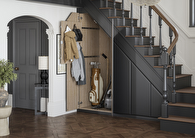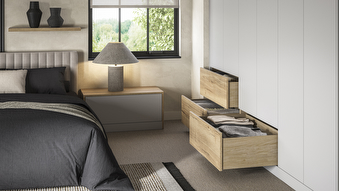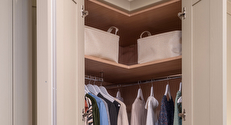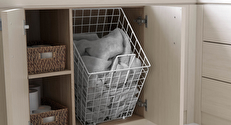
Five ways to reclaim unused space in older properties
Older properties are full of character, from high ceilings to unconventional layouts, but these features can also make furnishing and organising tricky.


Do you struggle to fall asleep when your head hits the pillow? Or find yourself waking up in the middle of the night repeatedly? It could be time to re-evaluate your sleep habits.
Figures from Mental Health UK estimate that around one in five people aren't getting enough sleep every night. The consequences of this can be significant. Poor-quality sleep impacts your physical and mental health, and poor health impacts your sleep – it's a vicious cycle that everyone should try to avoid.
If you're here to find out how to get better sleep, read our tips below. Try these and see if you notice any improvements.
Rule number one of good sleep hygiene is maintaining a consistent sleep schedule. Going to bed and waking up at roughly the same time every day helps to train your brain and body for optimal sleep.
This is closely linked to your circadian rhythm, which is essentially an internal body clock. The more consistently you sleep at a similar time, the more your body will be expecting to and the easier you should find it to drift off. It's not always possible, especially on weekends or if you work irregular shift patterns, but try your best.
So, it's not just about getting enough sleep (although that's still important) but getting that sleep in a consistent routine. Other things can disrupt your circadian rhythm, though…
Your body naturally responds to stimuli, such as light, throughout the day. Changes in light levels alter the hormones produced by your brain to make you feel more awake or more sleepy – processes driven by your circadian rhythm. For example, when the sun goes down and it gets darker, your brain produces melatonin to help your body prepare for sleep.
To avoid disrupting your body's natural cycles, limit bright light exposure for a couple of hours as you wind down for bed. Turn off harsh overhead lights that replicate daytime. Instead, use lamps or gentle fairy lights.
Limiting screen time before bed is also key. Devices like phones, TVs, kindles and tablets emit blue light that suppresses the brain's production of melatonin to make you feel more alert, not sleepy. If you are using devices, activate night mode to reduce the blue light being emitted.
Finding ways to wind down before bed is another good sleep hygiene habit to add to your consistent sleep schedule. We've already touched on avoiding harsh and blue light but your body and brain need to relax in other ways.
A wind-down routine that works for you might look completely different from someone else's. Whether it's a hot bath or shower, some relaxing yoga, a moment of mindfulness or a warm, herbal drink, find whatever brings calm to your mind and body. Doing these every night before bed should start to act like signals to your brain.
Your preparations can start even earlier. Avoid eating and drinking too close to bedtime, especially heavy meals, sugary foods and caffeinated drinks. These can reduce the quality of your sleep and make it harder for you to drift off. They can also increase your chances of waking up in the middle of the night.
If you're wondering how to get better sleep, you shouldn't ignore where it happens. Your bedroom environment plays an important role in how effortlessly you can fall and stay asleep.
The room should be quiet, dark and the right temperature for you. Distractions are never helpful when you're trying to sleep, so leave your phone on silent or out of the room entirely. Good curtains can help to minimise light and noise coming in from outside. If it helps, play ambient sounds like white noise or gentle music.
Don't forget the state of the room around you – mess equals stress for your brain. Elevated levels of cortisol (the stress hormone) can seriously impact sleep, limiting your ability to get into deep, restorative sleep states and even causing insomnia. Stay on top of clutter and keep your bedroom as clean as possible. Upgrades like overbed wardrobes and cabinets could be the ideal solution to add storage without making your sleep space feel too claustrophobic.
Hopefully, you've got some useful tips to take away with you about how to get better sleep. From good sleep hygiene habits to staying on top of clutter in your bedroom, there are plenty of ways to get more quality sleep every night.
Here at Hammonds, our goal is to help you make the most of your living spaces. If fitted storage solutions in your bedroom could help you rest easier at night, book a free design visit with one of our experts today.

Older properties are full of character, from high ceilings to unconventional layouts, but these features can also make furnishing and organising tricky.

Attics are often treated as overflow storage.

Starting your day in a calm, organised bedroom helps everything else fall into place.
Whether you have an exact vision in tow, or are just at the beginning stage of your home renovation, we have heaps of inspiration for you to get stuck into.
Find a wealth of design tips, trends and inspiration in the pages of our brochure, magazine and on our blog. Our experts are always ready to help you create dream home, pop in store or book your free design visit for experts to help on bringing your vision to life.